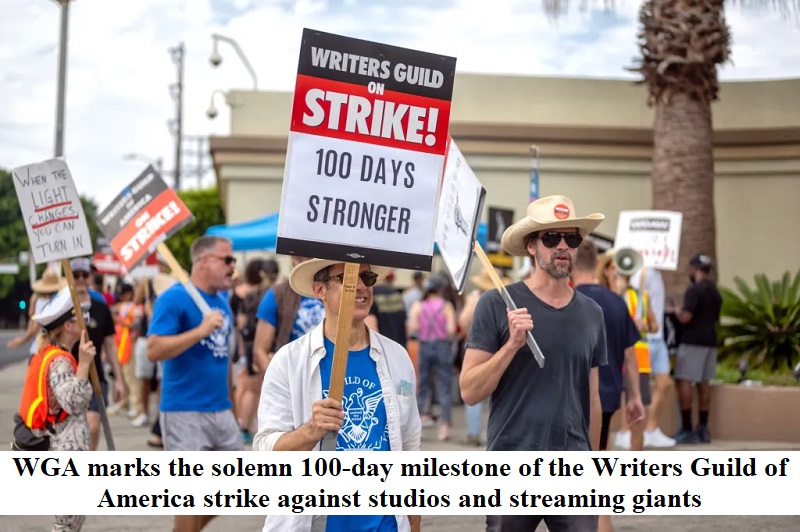
On Wednesday morning, individuals within Hollywood’s creative field, including writers and performers, united to observe the significant 100-day milestone of the ongoing Writers Guild of America (WGA) strike against studios and streaming giants. This remarkable demonstration of unity was mirrored by members of the Screen Actors Guild-American Federation of Television and Radio Artists (SAG-AFTRA), who are concurrently engaged in their own work stoppage. The actors’ strike began on July 14, while the WGA strike has been ongoing since May 2. The issues driving both strikes are notably similar, encompassing concerns about inadequate compensation in the era of streaming, the incorporation of artificial intelligence tools by studios for scriptwriting (in the case of writers) and for generating likenesses of actors (in the case of performers) to be used in lieu of the actual individuals in films and television shows.
This historic occurrence of a dual union strike underscores the resolute determination of writers and performers to attain equitable remuneration and address long-standing challenges within the entertainment industry. This actors’ strike holds particular significance as it marks the first time both actors and writers are standing alongside each other in such a manner since 1980.
At the forefront of the strike, impassioned writers and performers gathered on picket lines, notably outside the premises of Disney and Warner Bros studios. At Warner Bros, the picketers were accompanied by a jazz band, fostering a shared spirit that derived strength from their 100-day commitment to the cause. This strike’s impact reverberated throughout the industry, motivating established showrunners like Damon Lindelof to join the frontlines in support of their fellow writers. Lindelof, expressing, “With 99 days of marching behind me, the end isn’t in sight, but I’m feeling positive, resolute, convinced, and united,” encapsulated the unwavering determination that characterizes this strike.
Nonetheless, these picket lines hold more than symbolic significance. They have evolved into platforms for writers and performers to voice their calls for change. While the Alliance of Motion Picture and Television Producers (AMPTP) has been presented with opportunities to address the industry’s glaring challenges, they have faced criticism for their lack of engagement on pivotal subjects like the size of writers’ rooms and residuals based on success. Chris Kuna, a writer for Star Trek: Lower Decks, emphasized, “They’re waiting for us to falter or show internal discord, but if anything, our determination is only growing.”
Meanwhile, Damon Lindelof added a note of humor, stating, “Justin and I wrote a Star Wars movie together and picketing Disney is a lot more fun than writing a Star Wars movie,” referring to his colleague Justin Britt-Gibson. Both were dismissed from a Star Wars project by Disney.
This unified stance in the double strike has extended beyond the confines of the entertainment realm, encompassing broader societal issues. Ethan Peck, star of Star Trek: Strange New Worlds, expressed the collective frustration experienced by writers and performers. He channeled his anger towards the significant exploitation evident in the industry and beyond. The unity within the entertainment industry has enabled these creative professionals to stand united against income inequality and exploitation.
Historically, extended strikes of this nature have been infrequent within the entertainment domain. The WGA’s prior work stoppage in 2007-08 lasted for a comparable 100 days. However, the current strike transcends traditional matters, addressing the intricacies of the digital age, including residuals from streaming platforms based on success. The historical significance of this dual strike is accentuated by the resolve to confront contemporary challenges head-on.
These strikes have already generated notable disruptions, halting film and television production, resulting in release delays and financial uncertainty. Hollywood is essentially at a standstill, although exceptions exist for indie projects not affiliated with major studios constituting the AMPTP, the opposing entity in this narrative. The participation of prominent writers, performers, and showrunners has heightened public awareness, stimulating discussions that stretch beyond the entertainment sphere to include topics like income disparity, labor rights, and power dynamics. The revelation of artificial intelligence tools in content creation through these strikes has spurred debates concerning ethics, creativity, and human involvement in storytelling.
Continued strikes could exacerbate the challenges faced by the already struggling American entertainment sector. Some skeptics even predict that this could potentially mark the end of Hollywood as we currently recognize it.

Post Your Comments